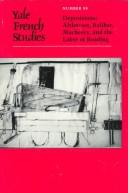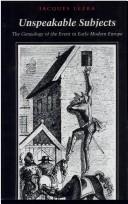| Listing 1 - 10 of 31 | << page >> |
Sort by
|

ISBN: 0300065787 9780300065787 Year: 1995 Volume: 88 Publisher: New Haven : Yale University Press,
Abstract | Keywords | Export | Availability | Bookmark
 Loading...
Loading...Choose an application
- Reference Manager
- EndNote
- RefWorks (Direct export to RefWorks)
This volume contains essays by Etienne Balibar and Pierre Macherey. It includes articles that place their work and Althusser's in the context of its critical effects on the problematics of cultural criticism and the affirmative deconstruction of concepts such as "class", "nation" and "race."
Deconstruction --- Déconstruction --- Althusser, Louis, --- Criticism and interpretation --- Critique et interprétation --- Critique --- Histoire --- Déconstruction --- Criticism and interpretation. --- Critique et interprétation --- Critique - Histoire - 20e siècle. --- Criticism --- Philosophy, French --- History --- Balibar, Étienne, --- Foucault, Michel. --- Hegel, Georg Wilhelm Friedrich, --- Macherey, Pierre. --- Marx, Karl,
Book
ISBN: 9781137591890 Year: 2016 Publisher: Basingstoke Palgrave Macmillan
Abstract | Keywords | Export | Availability | Bookmark
 Loading...
Loading...Choose an application
- Reference Manager
- EndNote
- RefWorks (Direct export to RefWorks)

ISBN: 0804727783 Year: 1997 Publisher: Stanford, Calif. Stanford University Press
Abstract | Keywords | Export | Availability | Bookmark
 Loading...
Loading...Choose an application
- Reference Manager
- EndNote
- RefWorks (Direct export to RefWorks)
Descartes, René --- Cervantes Saavedra, Miguel de --- Shakespeare, William --- Descartes, Renâe, - 1596-1650. - Meditationes de prima philosophia. --- Cervantes Saavedra, Miguel de, - 1547-1616. - Don Quixote. --- Shakespeare, William, - 1564-1616. - Measure for measure. --- European literature - 16th century - History and criticism. --- European literature - 17th century - History and criticism. --- Historicism in literature.
Book
ISBN: 9780823293544 Year: 2022 Publisher: New York, NY
Abstract | Keywords | Export | Availability | Bookmark
 Loading...
Loading...Choose an application
- Reference Manager
- EndNote
- RefWorks (Direct export to RefWorks)

Abstract | Keywords | Export | Availability | Bookmark
 Loading...
Loading...Choose an application
- Reference Manager
- EndNote
- RefWorks (Direct export to RefWorks)
Book
ISBN: 1137591897 1137581999 1137566574 Year: 2016 Publisher: New York : Palgrave Macmillan US : Imprint: Palgrave Macmillan,
Abstract | Keywords | Export | Availability | Bookmark
 Loading...
Loading...Choose an application
- Reference Manager
- EndNote
- RefWorks (Direct export to RefWorks)
Lucretius's long shadow falls across the disciplines of literary history and criticism, philosophy, religious studies, classics, political philosophy, and the history of science. The best recent example is Stephen Greenblatt's popular account of the Roman poet's De Rerum Natura (On the Nature of Things) rediscovery by Poggio Bracciolini, and of its reception in early modernity, winner of both a Pulitzer Prize and National Book Award. Despite the poem's newfound influence and visibility, very little cross-disciplinary conversation has taken place. This edited collection brings together essays by distinguished scholars to examine the relationship between Lucretius and modernity. Key questions weave this book's ideas and arguments together: What is the relation between literary form and philosophical argument? How does the text of De rerum natura allow itself to be used, at different historical moments and to different ends? What counts as reason for Lucretius? Together, these essays present a nuanced, skeptical, passionate, historically sensitive, and complicated account of what is at stake when we claim Lucretius for modernity.
Epicureans (Greek philosophy) --- Greek & Latin Languages & Literatures --- Languages & Literatures --- Lucretius Carus, Titus --- Criticism and interpretation. --- Influence. --- Lucrèce --- Lukrez --- Philosophy, Ancient --- Literature-Philosophy. --- Culture-Study and teaching. --- European literature. --- Philology. --- Classical literature. --- Poetry. --- Literary Theory. --- Cultural Theory. --- European Literature. --- Classical Studies. --- Classical and Antique Literature. --- Poetry and Poetics. --- Poems --- Poetry --- Verses (Poetry) --- Literature --- Literature, Classical --- Literature, Ancient --- Greek literature --- Latin literature --- European literature --- Philosophy --- Literature—Philosophy. --- Culture—Study and teaching. --- Lukrecjusz Karus, Tytus --- Lukret︠s︡iĭ Kar, Tit --- Lucrezio, Tito --- Lucrèce --- Lucrez --- Lucrecio Caro, T. --- Caro, T. Lucrecio --- Carus, Titus Lucretius --- Lucretius --- Lucrezio Caro, Tito --- Lucrecio --- Lucreti Cari, T. --- לוקרציוס קרוס, טיטוס
Book
ISBN: 9780823279425 0823279421 082327943X 0823279448 0823281523 0823279456 Year: 2018 Publisher: New York, NY : Fordham University Press,
Abstract | Keywords | Export | Availability | Bookmark
 Loading...
Loading...Choose an application
- Reference Manager
- EndNote
- RefWorks (Direct export to RefWorks)
On the Nature of Marx’s Things is a major rethinking of the Marxian tradition, one based not on fixed things but on the inextricable interrelation between the material world and our language for it. Lezra traces to Marx’s earliest writings a subterranean, Lucretian practice that he calls necrophilological translation that continues to haunt Marx’s inheritors. This Lucretian strain, requiring that we think materiality in non-self-evident ways, as dynamic, aleatory, and always marked by its relation to language, raises central questions about ontology, political economy, and reading.“Lezra,” writes Vittorio Morfino in his preface, “transfers all of the power of the Althusserian encounter into his conception of translation.” Lezra’s expansive understanding of translation covers practices that put different natural and national languages into relation, often across periods, but also practices or mechanisms internal to each language. Obscured by later critical attention to the contradictory lexicons—of fetishism and of chrematistics—that Capital uses to describe how value accrues to commodities, and by the dialectical approach that’s framed Marx’s work since Engels sought to marry it to the natural philosophy of his time, necrophilological translation has a troubling, definitive influence in Marx’s thought and in his wake. It entails a radical revision of what counts as translation, and wholly new ways of imagining what an object is, of what counts as matter, value, sovereignty, mediation, and even number. In On the Nature of Marx’s Things a materialism “of the encounter,” as recent criticism in the vein of the late Althusser calls it, encounters Marxological value-form theory, post-Schmittian divisible sovereignty, object-oriented-ontologies and the critique of correlationism, and philosophies of translation and untranslatability in debt to Quine, Cassin, and Derrida. The inheritors of the problems with which Marx grapples range from Spinoza’s marranismo, through Melville’s Bartleby, through the development of a previously unexplored Freudian political theology shaped by the revolutionary traditions of Schiller and Verdi, through Adorno’s exilic antihumanism against Said’s cosmopolitan humanism, through today’s new materialisms.Ultimately, necrophilology draws the story of capital’s capture of difference away from the story of capital’s production of subjectivity. It affords concepts and procedures for dismantling the system of objects on which neoliberal capitalism stands: concrete, this-wordly things like commodities, but also such “objects” as debt traps, austerity programs, the marketization of risk; ideologies; the pedagogical, professional, legal, even familial institutions that produce and reproduce inequities today.
LITERARY CRITICISM / Comparative Literature. --- Marx, Karl, --- Althusser. --- Freud. --- Lucretius. --- Marx. --- aleatory materialism. --- globalization. --- objects. --- reification. --- translation. --- untranslatability.
Digital
ISBN: 9781137566577 Year: 2016 Publisher: New York Palgrave Macmillan US :Imprint: Palgrave Macmillan
Abstract | Keywords | Export | Availability | Bookmark
 Loading...
Loading...Choose an application
- Reference Manager
- EndNote
- RefWorks (Direct export to RefWorks)
Lucretius's long shadow falls across the disciplines of literary history and criticism, philosophy, religious studies, classics, political philosophy, and the history of science. The best recent example is Stephen Greenblatt's popular account of the Roman poet's De Rerum Natura (On the Nature of Things) rediscovery by Poggio Bracciolini, and of its reception in early modernity, winner of both a Pulitzer Prize and National Book Award. Despite the poem's newfound influence and visibility, very little cross-disciplinary conversation has taken place. This edited collection brings together essays by distinguished scholars to examine the relationship between Lucretius and modernity. Key questions weave this book's ideas and arguments together: What is the relation between literary form and philosophical argument? How does the text of De rerum natura allow itself to be used, at different historical moments and to different ends? What counts as reason for Lucretius? Together, these essays present a nuanced, skeptical, passionate, historically sensitive, and complicated account of what is at stake when we claim Lucretius for modernity.
Literature --- History --- literatuur --- literatuurgeschiedenis
Book
ISBN: 9780823279456 Year: 2018 Publisher: New York, NY
Abstract | Keywords | Export | Availability | Bookmark
 Loading...
Loading...Choose an application
- Reference Manager
- EndNote
- RefWorks (Direct export to RefWorks)
Book
ISBN: 9789873621260 9873621261 Year: 2016 Publisher: Adrogué: La cebra,
Abstract | Keywords | Export | Availability | Bookmark
 Loading...
Loading...Choose an application
- Reference Manager
- EndNote
- RefWorks (Direct export to RefWorks)
| Listing 1 - 10 of 31 | << page >> |
Sort by
|

 Search
Search Feedback
Feedback About UniCat
About UniCat  Help
Help News
News